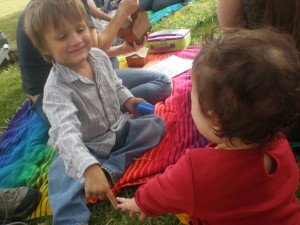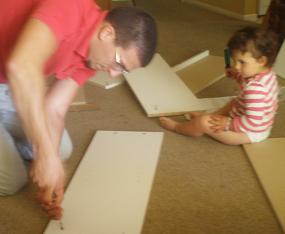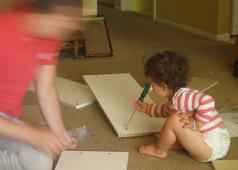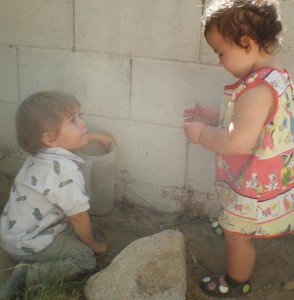 Empathy
EmpathyParents are often worried about how to develop Empathy in their children. They mostly do not expect a child to respond empathetic by nature. Parents focus on the ‘outcome’:
- You want your child to be nice and kind to other children or adults
- You want your child to help another child or another adult out who is in need for something.
- You want your child to think of others, to be considerate and share.
In order to get that outcome parents may say, “Be nice” and after a conflict, “Go and say you’re sorry”. Often however these words do not seem to be effective. These messages have to be repeated over and over. So what else can you do?
Lets have a closer look at it.
Empathy is indeed being kind, nice, considerate, and apologizing, offering remedy if relevant.
AND it is so much more!
- It is a total package of mindset and trust in oneself.
- It is not only meant to assist someone in their need,
it is also meant to be totally activated
in all learning
in all talking and listening,
in watching,
in being creative,
in play,
and in acknowledging someone who is in joy.
You want to be acknowledged for who you are, what you need. You want to receive understanding for all that you do and all that affects your life. In short: you want to matter.
When you experience that total attention and focus on you from someone, you know you matter.
When you give attention, and you focus on someone, they know they matter.
Everything we watch about wo/mankind behavior (or animal behavior, and even all nature behavior that resembles our behavior) needs Empathy to be understood. The complex situation of wo/mankind interactions can only really be grasped by the use of it. It is an energy that is in us and around us. It is the energy that connects us.
In today’s world it is so often said: ‘We are all one’. Well we will only perceive that as such when we live from Empathy.
All learning needs it. Anybody who shows, explains anything to someone, is in fact an assistant for the student, a moderator between knowledge and a person who wants to know, needs to have it, and needs to receive it in order to give his or her best.
When learning happens in the presence of Empathy, learning is fast, intense and joyful for anybody, being student or teacher.
Finally one needs Empathy for one self, for the journey one is in, for the here and now.
So it looks very complex but it is closer to our nature than you may think.
First let me make clear that having Empathy is different from having Sympathy. This is of very much importance. Many people can easily identify Sympathy. When you understand the differences, then you can start making more conscious choices and activate your Empathy more and more.
Sympathy
- You feel the same emotions as the person in need
- Your mind links your experience to theirs
- You feel upset or disturbed with someone’s upset
- You can become super enthusiastic about someone’s joy
- You can’t stop thinking about what is done to the person.
- You may feel guilty
- You identify with the person
- You either feel powerless and numb,
wanting to take action and give a solution you like,
or make your own problem the main focus - Physical distance
- You talk in solutions
- The other is uncertain whether you understand them
Sympathy is feeling the same emotions as the person who you have sympathy for, and linking that to a similar experience that you had before. You mostly have a strong emotional response because the person’s experience brings up memory of your own experience.
With sympathy you confirm what the other has going on and you link that to an experience you had or you heard of before : “Oh, i know, i had that too and you know what…etc.” You may give a solution: “You should do that…”, but the other person is not empowered to come up with another solution themselves. The problem is in fact ‘doubled’: now they have to do what you told them.
In the situation that the other person is hurt by you, you may think or tell them that they may have done something similar to you, or you start defending yourself, so you reject their complaint.
You can see why things are harder to resolve with Sympathy.
Empathy
- You can imagine what the other feels
- You have an open mind
- You have a humble, gentle feeling for the upset someone has.
- You have a humble, gentle feeling for the joy someone has.
- You want to understand the persons action and their feelings
- You are an assistant
- You assist the person to look for a solution they like
- Physical closeness
- You practice ‘EmPathIQ Listening’ (Be aware of yourself-the other in this situation Feed back of what you see, feel, hear and feed back the feeling, emotion the other shows)
- The other feels acknowledged by you
In Empathy you can imagine what the other person feels, you can have an open mind and a humble, gentle feeling in understanding the actions the other is performing. You will experience a humble, gentle feeling for the feelings they have, show, or talk about.
With Empathy you can assist somebody looking for their own solution:
“Oh i see, you felt left all by yourself, and you even were wondering when you will get your life back together”.
Then the other person has to think further, talk some more and may come up with a solution.
In the situation that the other person feels hurt by you, you may apologize and offer something to make it up.
Many babies and toddlers show a lot of Empathy:
“Aie, that hurts” a mother may say when breastfeeding a baby who feels for the first time his chewing-function in his jaws. At first the baby shows a shock on his face and twists and twirls his body, to quickly ‘assess’ the situation. Then they try to ‘make it up’, by giving the mother the most darling smile and reaching towards her with their arms and legs.
Empathy is a social survival skill that we all have access to, and is practiced and confirmed straight away in the first hours of our life.
We show babies our Empathy by responding to their fussiness or their cries, talking out loud,
“Oh honey you must be hungry”,
helping them out, supporting them in walking etc etc.
Compare this to Sympathy when you would say: “Oh well, I am hungry too”.(!)
Because you can IMAGINE what they are going through, you are assisting children not only in working through their upsets and pains, but also in all they want to master. Their inner drive to learn, to copy, practice, know, find out and master.
 Their inner drive to learn
Their inner drive to learn
As a parent you show Empathy mostly naturally when children do not use language yet.
- We must use Empathic Awareness to bring into consciousness what we need to know and understand.
- Empathic Awareness is the unconscious Knowing.
- Once we bring the unconscious Knowing into consciousness, we experience Empathy.
- Then our supportive actions will follow gently.
 Our actions will follow gently
Our actions will follow gently
How the use of Empathy is undermined
The problem starts when we think the child should understand language.
In growing up a child gets confused in whether Empathy is a handy thing. They hear:
- “No”, “No, no, no.”
- “Don’t do that”
- “You’re mean”
- “You can’t do that”
- “Watch it”
- “Don’t touch”
- “Put it back”
- “Give it back”
All these messages are the opposite of Empathy messages.
TRY IT! Try being humble and gentle and then say out loud one of these above ordering messages.
Empathy messages would express understanding what the child needs or what it is after. Depending on the situation it may sound like:
- “He wants to do it himself”
- “The sand may get in her eyes”
- “You seem to be done”
- “There is a step”
- “That’s fragile”
- “You like those dolls, hein?”
- “He really wants to have his toy back”
NOW TRY to have the humble and gentle feeling and say the above sentences.
DID you feel the DIFFERENCE?
From the view of a child
When you are two years old and you are in the awareness of that you are a separate “i” from your mother or father, but many things you seem to want, or do, are seen as ‘trouble’, you will soon shut down your use of Empathy yourself.
Your parents show you that it is not done in the world. You even may see it hardly being used between the two of your parents.
But where it really gets odd is when your mother tells you with a strong voice to make it up with another crying child when you pushed the child away from your toy. The connection of a feeling of Empathy is nowhere around here!
- Not coming from the mother,
- not from the other child,
- not from you
and you have to perform an action that adults claim is Empathy: “Be nice” and “Make it up” while you don’t feel like doing that at all.
This causes so much confusion and denial of what your ‘guts’, your intuition told you, that Empathy becomes a ‘no-no’.
How to re-open Empathy?
If you have forgotten how to get to the place of Empathy, you can
1. Imagine you would be in the situation that you see a person in.
2. You can Practice EmPathIQ Awareness
3. You can Practice active and deep Listening and learn Peaceful Conflict Resolution
All this you can master in the EmPathIQ Communication Family Training.
Ask for the schedule of the next trainings: ceacilleaemahmn@protonmail.com
You teach your children Empathy best by practicing Empathy yourself.
Empathy is imitated and used by children when the adults in their lives practice it.
Then when the child is in need to receive Empathy they even help you to give it to them.
A story of my own:
My oldest was 3 years old. We were at the playground where there was also a cafe. He was playing in the sandbox, meanwhile I was reading a book and sipping coffee. His toy truck stood next to my chair.
A little boy came up to me and asked if he could play with the truck.
“Sure” I said.
My son came running up to us and grabbed the truck wildly out of the boy’s hands, shouting: “That’s mine!”
I gave him the following active listening message: “That was pretty scary that the boy was taking your truck and especially that i just decided that for you.”
He said “Yes”. He still looked aggressively to the boy.
I apologized to the boy: “I am sorry, i should have asked my son because it is his truck.”
The little boy looked at us with big bright eyes, then got a big smile and said: “Okay”
We all three were relaxing and the boy said that he had something else to play with.
I apologized to my son and then came his answer:
“It is the same as you go to the bathroom and your book is on the table and another mother takes it to read and i say okay and you come back and your book is gone”.
My heart felt so mellow and humble when he explained it this way to me and i felt totally Empathy for his feelings and actions. He helped me imagining. Imagination is another important part to generate Empathy.
IMPORTANT NOTICE:
That you feel Empathy for one’s feelings and actions does not mean that you approve of them, nor that it would be the way you would do it! (Then it is again sympathy)
Once parents understand this difference, they are more relaxed and more open to choose feeling Empathy for their child’s feelings and behavior.
Another great skill of training i offer parents is, that you learn how to address future similar upsets if those may occur.
Children amongst children
 In Freedom humble and gentle feelings show up
In Freedom humble and gentle feelings show upHow the child has a chance to experience and show Empathy with other children:
1. They have to be allowed to play free and have freedom of movement, without an adult guiding them or doing a guided activity.
notice: The adult is staying close by though
(Ha, what a great opportunity to exercise your own Empathy)
2. Their basic needs must have been met. Being hungry, tired, scared, overwhelmed, stressed, all stands in the way for a child (as it does for a parent!)
3. They must have a chance for physical imitation Play
4. They must have a chance for role-play
5. There are preferable different similar toys present. For example: several rattles ; dolls ; cars ; enough dress up clothes. Or a toy that they can work with together like a doll-house, a garage, a sand funnel, a bucket.
Not all children show Empathy in the same way. From Empathy may follow an action for the one in need. This is their expression of their empathy.
For young children the action they take can be:
– Bringing something to the person in need.
– Sharing a favorite toy or food
– Standing near the person and looking at them
– Putting a hand on their shoulder.
– Bending over and asking if they need anything
For older children
– Arm around the shoulder
– Talking
– Getting an adult to help out and explaining the situation from the view of the child in need
For teenagers
– Hugging
– Sitting silent together
– Talking
– Keeping others away (getting others involved is often creating sympathy)
– Getting an adult
How does Empathy work for you?
– Do you feel it in certain moments?
– Does it show up for you in your language and actions?
Towards your child
– Do you show, express your gentle and humble feeling for what a child thinks, feels and does?
Towards your partner or other adults
– Do you show your Empathy for what they think and feel and do?
– Do you express out loud with gentle words that you can imagine they do this or that because they may this or that having going on, to others? Also when your child is around?
Or are you more focused on the negative side of behavior?>
– Do you talk negatively about your spouse to others?
– Also when your child is around?
– Do you talk negatively about neighbors, your boss, or joke about the lady down the street?
– Also when your child is around?
To your Empathy growth and your child’s Empathy exploration!
